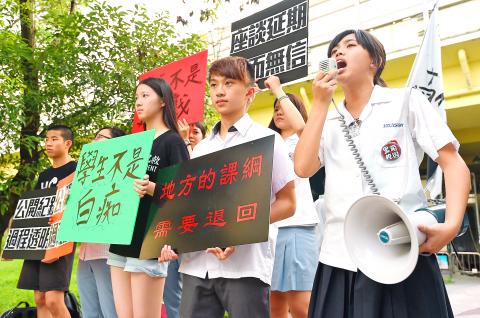Deputy Legislative Speaker Hung Hsiu-chu (洪秀柱) yesterday weighed in on controversy over the Ministry of Education’s high-school curriculum adjustments, saying the changes were “too minor” and “far from enough.”
The Chinese Nationalist Party (KMT) presidential hopeful said in an interview with radio host Tang Hsiang-lung (唐湘龍) yesterday morning — who called the curriculum controversy “the most bloody, political and vicious machination” — that it is “wrong to call the adjustment process a ‘black box.’”
Defending the ministry against a court ruling that its conduct in planning and deciding the adjustment process was not transparent enough, Hung said that it was the composition of the curriculum adjustment committee, rather than the adjustments per se, that was admonished by the court.

Photo: Liao Chen-huei, Taipei Times
However, “consider this: If [the ministry] did make public the names of the members of the curriculum adjustment committee, given the prevailing political mood, no one would dare join the committee in the future,” she said.
“Even those who are rational and hard-working would not dare to do so, because they will be harshly criticized, humiliated or even harassed at their residence. How can the ministry make the list public?” she said.
Hung claimed that if the ministry had asked a group of academics who have a different political leaning, such as those who favor Taiwanese independence, to sit on the committee, “there definitely would have been no problem at all,” because KMT supporters would not harass those academics or make a scene “thanks to a different political culture.”
As for the curriculum adjustments, Hung said they were “way too minor” and “far from enough.”
“Almost nothing has been changed,” she added.
The curriculum guidelines have to be revised in accordance with the Constitution of the Republic of China, Hung said, adding that the ministry had already been “compelled” to make concessions, such as allowing teachers to prepare their own additional teaching materials and promising that controversial parts would not be tested.
“History as a subject underwent a 180o change during the administrations of [former] presidents Lee Teng-hui (李登輝) and Chen Shui-bian (陳水扁),” she said. “Were the names of curriculum committee members made public then?”
“We are simply returning [the curriculum] back to the right track — a track that is in accordance with the ROC Constitution,” she added.
Tang said he was “deeply concerned,” as the “Sunflower movement generation” who have been taught these revisions, now have a “distorted, self-rationalized and relatively self-isolated view of history.”
“Yes,” Hung said repeatedly, expressing enthusiastic approval of Tang’s remarks.

The US government has signed defense cooperation agreements with Japan and the Philippines to boost the deterrence capabilities of countries in the first island chain, a report by the National Security Bureau (NSB) showed. The main countries on the first island chain include the two nations and Taiwan. The bureau is to present the report at a meeting of the legislature’s Foreign Affairs and National Defense Committee tomorrow. The US military has deployed Typhon missile systems to Japan’s Yamaguchi Prefecture and Zambales province in the Philippines during their joint military exercises. It has also installed NMESIS anti-ship systems in Japan’s Okinawa

‘WIN-WIN’: The Philippines, and central and eastern European countries are important potential drone cooperation partners, Minister of Foreign Affairs Lin Chia-lung said Minister of Foreign Affairs Lin Chia-lung (林佳龍) in an interview published yesterday confirmed that there are joint ventures between Taiwan and Poland in the drone industry. Lin made the remark in an exclusive interview with the Chinese-language Liberty Times (the Taipei Times’ sister paper). The government-backed Taiwan Excellence Drone International Business Opportunities Alliance and the Polish Chamber of Unmanned Systems on Wednesday last week signed a memorandum of understanding in Poland to develop a “non-China” supply chain for drones and work together on key technologies. Asked if Taiwan prioritized Poland among central and eastern European countries in drone collaboration, Lin

ON ALERT: Taiwan’s partners would issue warnings if China attempted to use Interpol to target Taiwanese, and the global body has mechanisms to prevent it, an official said China has stationed two to four people specializing in Taiwan affairs at its embassies in several democratic countries to monitor and harass Taiwanese, actions that the host nations would not tolerate, National Security Bureau (NSB) Director-General Tsai Ming-yen (蔡明彥) said yesterday. Tsai made the comments at a meeting of the legislature’s Foreign Affairs and National Defense Committee, which asked him and Minister of National Defense Wellington Koo (顧立雄) to report on potential conflicts in the Taiwan Strait and military preparedness. Democratic Progressive Party (DPP) Legislator Michelle Lin (林楚茵) expressed concern that Beijing has posted personnel from China’s Taiwan Affairs Office to its

BACK TO WORK? Prosecutors said they are considering filing an appeal, while the Hsinchu City Government said it has applied for Ann Kao’s reinstatement as mayor The High Court yesterday found suspended Hsinchu mayor Ann Kao (高虹安) not guilty of embezzling assistant fees, reducing her sentence to six months in prison commutable to a fine from seven years and four months. The verdict acquitted Kao of the corruption charge, but found her guilty of causing a public official to commit document forgery. The High Prosecutors’ Office said it is reviewing the ruling and considering whether to file an appeal. The Taipei District Court in July last year sentenced Kao to seven years and four months in prison, along with a four-year deprivation of civil rights, for contravening the Anti-Corruption